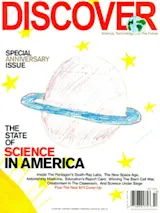It’s hard to argue with blood transfusions. Each year, nearly 5 million Americans receive them, and for many patients it’s a definitively life-saving therapy.There is, of course, a risk in transmitting diseases like hepatitis and HIV through transfusion, but modern operations can all but eliminate that threat. Curiously, however, there have been persistent observations about another problem with blood transfusion: In some settings, blood transfusions worked less effectively than expected, but no one knew exactly why. Now two groups at Duke University may have found the reason: the loss of the molecule nitric oxide from stored blood.
Nitric oxide is one of those "big" molecules. Its first biological effects were described in the 1970s, and in the 1980s it was determined that the gas contributes to the normal dilation of blood vessels. This led to an avalanche of research, a 1998 Nobel Prize for its discoverers, and, most famously, the ...














